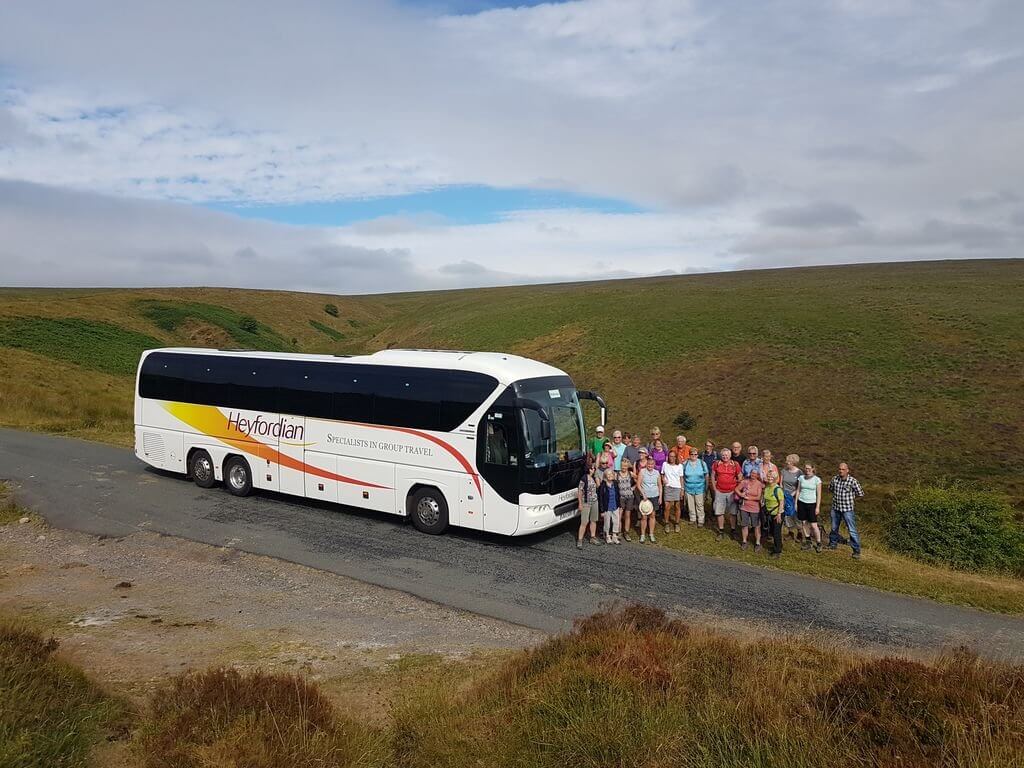
Stephen Smith is the third generation of the Smith family to be involved in running Heyfordian Travel, but as he explained to Andy Izatt, a career quite literally a world away from coaching has given him a very different perspective on how the business should be run
What is now Bicester-based Heyfordian Travel was established by James Thomas Smith in Upper Heyford during 1947, although its transport roots date back to the 1890s. The business is now run by second and third generations of the Smith family, General Manager Stephen Smith coming from the third generation. Stephen spent most of his career working for an American company that built major marine engineering projects around the world. That experience could not have been more different to running a coach company, but he is, nevertheless, very much enjoying his latest challenge.
Broad experience
“I came from Upper Heyford originally and when I left school, the RAF seemed like a good place to go because I wanted to fly planes,” explained Stephen. “I failed flying selection due to my eyesight, but with nothing much else to do at the time, still stayed in for a short service six-year commission.
“A friend, Adrian Illman and I, decided we wanted to drive a Land Rover to Cape Town. We left in 1992 on my 25th birthday, but only got as far as Niger because of a coup. We had to sell the Land Rover and flew back to Europe, but still wanted to go to Cape Town so ended up backpacking our way there from Mombasa after joining a package holiday to Kenya.
“I’ve always loved maps and the sea. I ended up studying hydrography (mapping the ocean) with marine engineering at the University of Plymouth with a view to becoming a marine engineer. While I was there I met my future wife, Helen who was studying at King’s College London. We were married a month after I graduated.
“Adrian and I were still committed to driving a Land Rover to Cape Town. Helen was still at university, but took a year off to join us. In the end there were five of us who camped for 10 months to get there. It was a fantastic trip, but when we got back I had no money so needed to work. After a couple of other jobs I joined an American firm called the Great Lakes Dredge and Dock Company, the biggest dredging and marine contractor in the Western Hemisphere. I worked for it on engineering projects all over the world for the best part of 20 years with my wife who was a special needs teacher going with me whenever that was possible.
“I worked in countries as diverse as Australia, Singapore, India and Iraq. My last job was as Project Director for widening and deepening the Suez Canal and working for an American company meant we had to be very strict about security. We employed ex Italian Special Forces guys who were a great bunch – really professional – and they guarded us in our compound day and night. However, it wasn’t a place I wanted to take Helen. When the project was completed we decided it was time to properly settle down. The house we bought is in seven acres and we keep animals.”
Different challenge
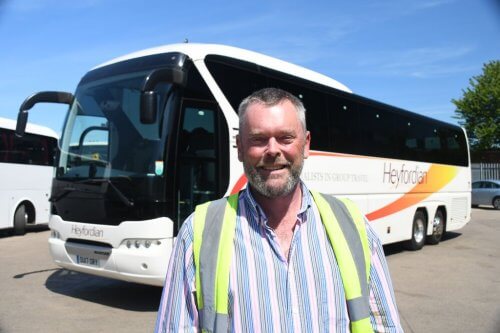
“My father, Roland Smith had come out to Egypt to talk to me about Heyfordian Travel,” recalled Stephen. “As the eldest of four brothers who were all directors, he was, and still is Chairman, but pointed out that they were all getting on in years. They wanted to modernise the company and bring in some fresh blood. He’d seen what I’d done on some of the projects I’d worked on and said he wanted to harness that experience.
“Helen always knew that at some point I would work for the family firm, but, to be honest, I never saw it that way. What persuaded me was attending my granddad’s funeral in 2015. I could see that the directors were getting on in years and there was no one in the business who would be in a position to take over anytime in the near future. I agreed to become General Manager starting at the beginning of 2016.
“For the first year I didn’t really do very much, just observing what was going on. The head office and main depot had moved from Upper Heyford to Bicester in 2000, but the business had continued to be run very much on ‘old school’ lines. We were operating 95 vehicles, many of which were getting on in years. A lot of what we were doing was tendered bus services that were making money at the beginning, but those margins were gradually eroded due to council cuts. We were suffering because we tried to retain the work at any cost even though what we were making had become minimal or non-existent. One of the first things I did was review those bus services.
“After a few months I could see the inefficiencies of the operation. The team running the business was fragmented. In some cases people had been doing the same job for years and each department tended to focus on its own objectives rather than the ‘big picture.’ There were no meetings to discuss common issues and objectives.
“At the end of the first year I took the directors through what I’d found and how I thought we should restructure the company. Planning is so important and I proposed one for the next three years. Because I had the facts, it was hard to dispute them or disagree with what I wanted to do. In fact the directors have always been very supportive and very receptive to improvements and change.
“Overheads needed to be cut by half and that unfortunately meant that some staff would have to be laid off, but I tried very hard to keep that to a minimum. I think in the end it was just six people.
“One of my uncles, Andrew, was Engineering Director. He was really helpful, but had a very traditional approach to running the workshop, which he’d done since the 1970s. There was no budget mechanism and I felt it was time his Workshop Supervisor son, Daniel (my cousin) was given the opportunity to show what he could do. Daniel embraces new technology and the workshop didn’t miss a beat once he took over. It has a weekly budget that’s linked into a bonus scheme. In fact, the company has a number of bonus schemes now, including ones for the management and the drivers.
“I’ve not brought anyone into the management team from outside. The people here have been loyal to the company for a long time and Jane Smith (no relation) was one of the longest serving. When I first arrived she worked in the sales team, but I felt she was very competent and had real potential. I made her our Inter Office Manager – a new position I created. It’s an American title, but explains exactly what she does. She’s the focal point between all the departments and has stepped up nicely to the task, even now chairing the weekly operations meetings rather than me.
“Developing staff is something I’ve done in countries all over the world. What’s really important is encouraging people to work together, linking departments and cross training so everyone is flexible in what they can do. I always found that the American culture greatly promotes this ethos.
“There should be no strict job demarcation. No boundaries. While my uncle Graham who was Commercial Director has retired, my other uncle Jeremy continues as Managing Director. It used to be that he did most of the pricing. Now the pricing function is spread across the team.
“It’s a small team, but people were set in their roles and that had to change. There was little engagement with staff or encouraging them to work towards meeting KPIs (Key Performance Indicators). They did have some, but we together developed them much further. KPIs are important. Involving people in what the business is doing and setting targets is important. The more they understand about what they’re doing, the more they will give and the bonus schemes provide that extra little incentive. I also gave all our key managers budgets so that they could authorise small amounts of expenditure without asking a director.”
Frontline focus
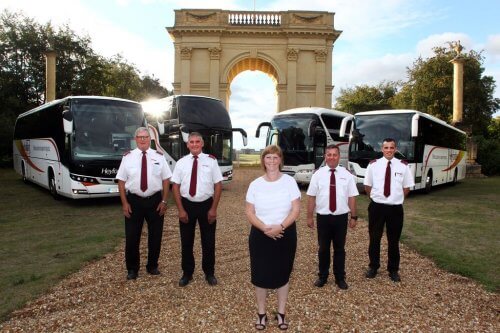
Said Steve: “This is a big company with a turnover close to £6m. My priority was upgrading the frontline fleet in particular and getting training in place for new drivers. Alongside that we did quite a lot of marketing.
“There were too many vehicles and too many of them were spending too long off the road. We either got the tools for the job – the right vehicles and drivers – or there was no point continuing to develop the type of business we had. We would be better off focusing on school contracts with 50 vehicles and employ just part-time drivers.
“When it came to upgrading the fleet I had tremendous support from Jeremy. I don’t think cascading frontline vehicles is the right thing to do although it happens a lot across the industry. That’s because there is something called a ‘plant curve.’ The point where a vehicle should be disposed of depends on how much it’s costing you in relation to how much work it does. You dispose of it when it still retains a reasonable value.
“We now lease most of our top fleet although there’s some crossover with our best private hire vehicles. Frontline touring vehicles don’t stay more than five years. Everything older than 10 years is in the contract fleet and there’s also much greater standardisation across what we operate.
“I talked to Andrew before he left and he recommended MAN and Volvo. MAN is our choice for new, particularly the Tourliner, but also Beulas-bodied single and double-deck coaches. Initially we didn’t get good support from the local dealer, but we do now. We have regular three-monthly meetings that are chaired by my father where we go through everything with MAN. We also have regular meetings with our other key vehicle suppliers.
“What has also changed is seating capacity. We have bigger vehicles with more seats and that’s why we’ve bought 74-seat MOBIpeople MANs from BASE. Roughly half our work is contract-based. School classes are getting bigger. A lot of our clients don’t want double-deckers because they need more staff to look after the children. Now they know we have these coaches, they want to hire them. What’s more, they’re far more fuel efficient than a ’decker.
“There are 50 vehicles based at Bicester where all maintenance is carried out and another 20 and 10 respectively based at High Wycombe and near Oxford. The balance of our work has, to an extent, been dictated by circumstance. As I’ve said, I wasn’t happy with doing service runs. The subsidies were reduced or removed so we axed those, but did try running some commercially for a time. It soon became clear we were making no money so we stopped, and it’s not work I want to get involved in again. That gave us a better balance in the rest of the business. We now supply coaches to 15-20 tour providers, undertake private hire and the remainder of our work is school and college runs of which we have around 65 a day.
“While some of our contracts are for Oxfordshire and Buckinghamshire County Councils, we also work for private schools and have agreements with groups of parents. One of those for a group in Milton Keynes has grown from a 50-seater to an 82-seat ’decker and a 50-seater in a couple of years and it looks like we’ll be running three vehicles from September.
“There was no culture of reporting in the business when I first arrived – writing things down – so that was something else that I quickly changed. I also have a law degree so fully understood just how important that can be.”
Customer facing imperative
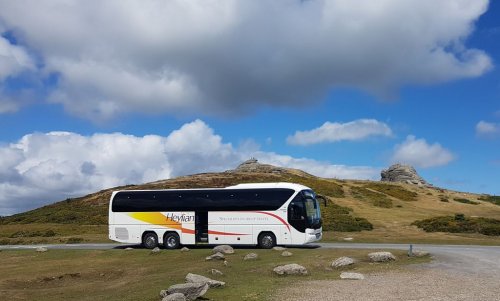
“I learnt to drive a coach in 1990 – a good skill because I could drive during the holidays when I was at university. I used to take a coach on tour and take all my college work with me.
“I’m often out in the yard with the drivers when they come in at 0530hrs. Generally speaking, they’re all great guys. It’s nice to ask about their families. How their kids are. Everyone feeling part of what we’re doing is important.
“What I don’t like are ‘prima donnas’ and I can’t be bothered with negative attitude. I certainly won’t tolerate moaning and bitching. For me, employing any driver who comes along, just because they were available, was no longer an option. It’s important to invest in your people and that’s why we developed further our training school. We have a fantastic training officer, we’re JAUPT (Joint Approvals Unit for Periodic Training) accredited for the Driver CPC, and other local operators send us their staff as well.
“What we put in place for our driver recruitment was a rolling programme that we usually run every three months. I introduced a proper selection process and so far we’ve employed 20 new drivers, 15 of whom are still with us. I think that’s a good retention rate. If they leave within six months they have to pay back all of the cost of their training. If they stay more than two years, they’re fully discharged from the debt. The people we’ve taken on are young, keen and don’t come with an attitude.
“One of our new recruits has been with us 18 months and is now Assistant Traffic Manager. On his first day as a driver we sent him from Oxford to Eastbourne in a coach full of passengers. He just got on with it and we had glowing reports back.
“We no longer have a driver problem or shortage and we’re actually employing more than when I started. There’s a whole package of benefits available to them that include help lines, confidential support and doctors’ services. We were one of the first companies to enrol them in the Transport Benevolent Fund and they have also had a significant pay rise.
“Heyfordian has always had smartly-dressed drivers. Personally, I don’t agree with uniforms probably because I had to wear one for six years in the RAF. What’s important to me is they’re clean and smart, and uphold the company customer service values by being friendly, polite and helpful.
“Everyone has to be flexible and be prepared to do anything and we’ve introduced a number of new initiatives. We have increased our utilisation considerably by focusing on more weekend work, and also introduced schemes where we’re even happy to pay a driver to stay at home if the work is not there for a particular day.
“Traditionally they would have to report in for yard days, but I just ask two or three to come in and do that. The rest are on a scheme where they can either be on standby or just stay at home. Everyone loves it and it actually saves us money.”
Delivering results
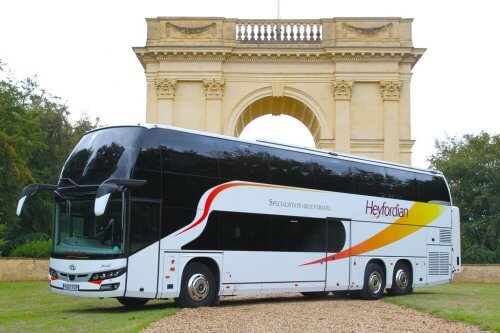
“We have had record revenues year-on-year since I joined Heyfordian and we halved our long-term liabilities in two years. It was mainly from HP payments and capital invested in the company. There has been a real emphasis on paying those debts back.
“One of the roles I had at Great Lakes was project problem solver and managing people to get the best out of them is what I love doing best. It was wonderful coming here not having any of the preconceptions I might have had if I’d worked in the family business all my life. Getting everyone to work together and be one team has been great.
“I’m a director of Heyfordian, but I want to get the business to a point where it runs itself day-to-day. People were not ready for that when I joined, but now I feel really comfortable with how we’re operating. My workload has gone down tremendously, as have the number of complaints and problems I have to deal with.
“There will be another three year plan after this one, but I think it’s clear everything is going in the right direction. I think we’re where we need to be in terms of developing the business. We could always have more work, but I’m very comfortable with the fleet. If anything, we might rationalise it down to maybe 70 vehicles. A lot of the focus now has to be on further improving efficiency. There will also training for managers which I’m looking forward to doing myself.
“I have people here who know all the ins and outs of this business. I have all the experience of this industry I will ever need available to me through them. All I need to do is ask. We have the right systems and procedures now. What’s important is we never take our eye off the ball and continue to focus on improvement.”

